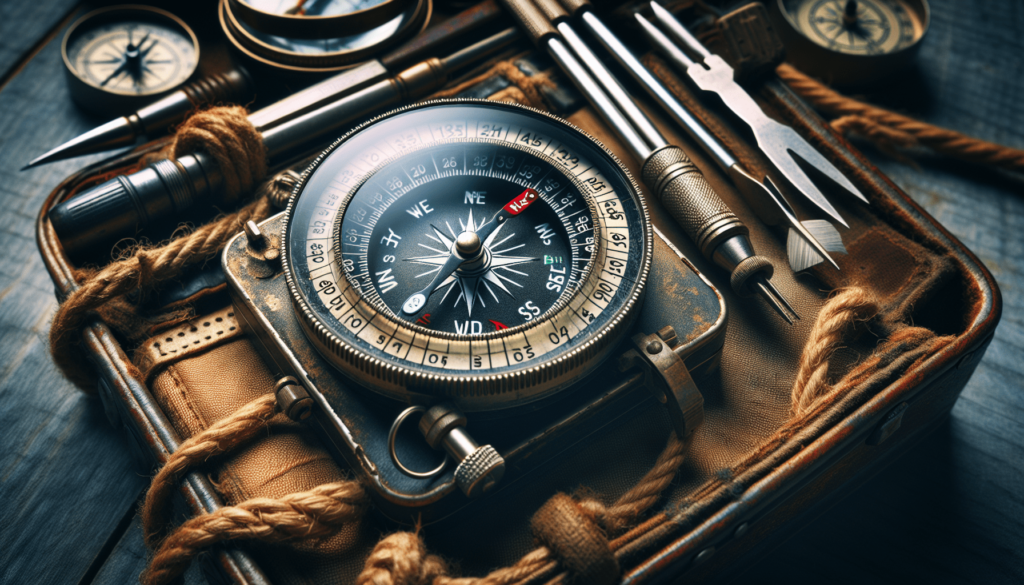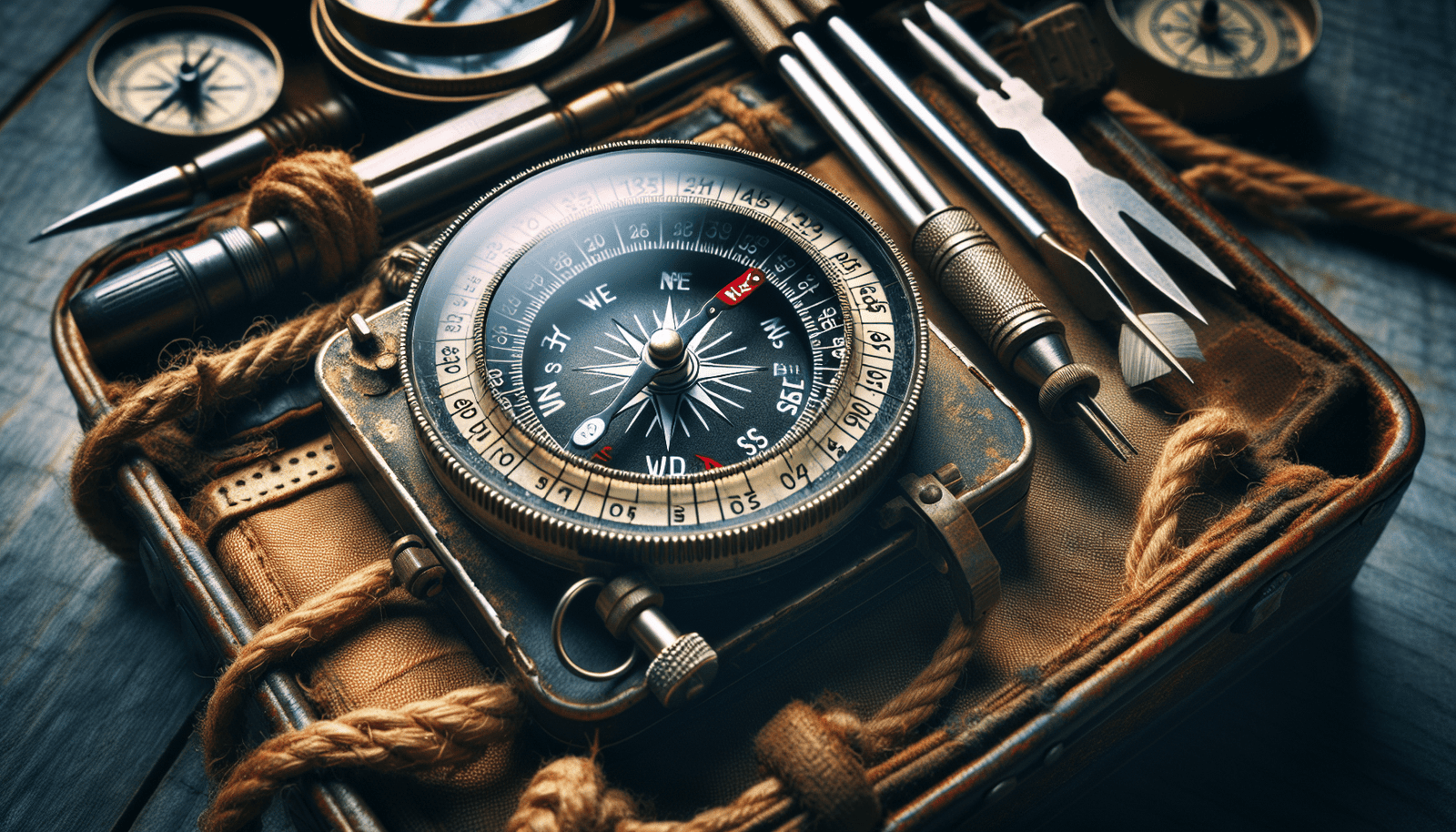If you’ve ever wondered about the essential skills needed for overlanding, look no further! In this article, we will explore a variety of crucial overlanding skills that will help you navigate the great outdoors and make the most out of your adventures. From mastering navigation techniques to honing your vehicle repair abilities, this guide will provide you with a comprehensive overview of the skills you should acquire to become an experienced overlander. So get ready to enhance your outdoor prowess and embark on unforgettable journeys!
Navigation Skills
Map reading
Map reading is a fundamental skill for any overlander. Being able to interpret and navigate using a map allows you to plan your route, track your progress, and find your way in unfamiliar terrain. Familiarize yourself with map symbols, legends, and scale to effectively navigate using a map.
Compass navigation
A compass is a reliable tool that helps you determine your direction and navigate accurately. Learn how to read a compass and understand the different types of compass bearings, such as true north and magnetic north. Practice using a compass to orient yourself, follow bearings, and navigate through challenging landscapes.
GPS navigation
While traditional map reading and compass navigation are essential skills, GPS navigation has become increasingly popular in the world of overlanding. Understanding how to use a GPS device or a smartphone application specifically designed for navigation purposes can greatly enhance your overlanding experience. Learn how to set waypoints, create routes, and interpret GPS coordinates to efficiently navigate to your destination.
Route planning
Effective route planning is crucial for a successful overlanding trip. Consider factors such as distance, terrain, fuel stations, and potential campsites when planning your route. Utilize maps, online resources, and local knowledge to identify the best possible routes based on your preferences and the capabilities of your vehicle. Remember to have alternative routes in mind in case of unexpected obstacles or closures.
Vehicle Maintenance and Repair
Basic vehicle maintenance
Overlanding often takes you to remote areas where professional assistance may be limited or nonexistent. Being familiar with basic vehicle maintenance tasks such as checking fluid levels, inspecting tires, changing air filters, and cleaning spark plugs is vital. Regular maintenance can prevent breakdowns and ensure your vehicle is ready to tackle challenging conditions.
Tire changing
Flat tires are a common occurrence while overlanding, especially when driving off-road or on rough terrain. Mastering the skill of changing a tire is essential. Learn how to safely jack up your vehicle, remove and replace the wheel, and properly inflate the new tire. Additionally, understanding tire pressure requirements for different terrains is crucial for optimal performance and to prevent tire damage.
Changing oil and fluids
Regularly changing your vehicle’s oil and other fluids, such as coolant and brake fluid, is necessary to maintain its performance and longevity. Familiarize yourself with the manufacturer’s guidelines for oil change intervals and fluid specifications. Learn how to safely drain and replace fluids, as well as how to properly dispose of used fluids in an environmentally friendly manner.
Replacing spark plugs
Spark plugs play a crucial role in the ignition process of your vehicle’s engine. Over time, they can become fouled or worn out, affecting engine performance and fuel efficiency. Knowing how to replace spark plugs is a valuable skill that can help resolve engine misfires and improve overall vehicle performance. Consult your vehicle’s manual for specific guidance on spark plug replacement intervals and procedures.
Understanding vehicle warning signs
Being able to recognize and understand common warning signs in your vehicle is essential for identifying and addressing potential issues before they escalate. Familiarize yourself with warning lights on your dashboard and their meanings, as well as any unusual noises or vibrations. Addressing warning signs promptly can prevent major breakdowns and costly repairs while on the road.

Off-Road Driving
4×4 driving techniques
Off-road driving requires specific techniques to handle different terrains and obstacles. Learn how to engage and disengage your vehicle’s four-wheel-drive system and understand when to use high or low gears for optimal traction. Practice techniques such as hill starts, slow crawling, and navigating through uneven terrain to become comfortable with off-road driving.
Driving on different terrains
Overlanders encounter a variety of terrains, including gravel, sand, mud, and rocky surfaces. Each terrain requires different driving techniques to maintain control and prevent getting stuck. Learn how to adjust your driving style to effectively navigate through these terrains, such as reducing tire pressure for sand driving or maintaining momentum in muddy conditions.
Hill climbing and descending
Hill climbing and descending can be challenging, especially in off-road environments. Mastering techniques such as maintaining momentum, using proper gear selection, and understanding weight distribution in your vehicle can make hill climbs and descents smoother and safer. Practice on different inclines to improve your confidence and control.
Driving in sand and mud
Driving in sand and mud can be particularly demanding due to the potential loss of traction. Understanding how to handle these conditions is crucial for successful overlanding. Techniques like airing down your tires, keeping a constant speed, and avoiding sudden maneuvers can help you maintain control and minimize the risk of getting stuck.
Recovery techniques
Despite thorough preparation, there may be instances where your vehicle gets stuck or encounters other difficulties. Knowing proper recovery techniques is essential for self-reliance in these situations. Learn how to use recovery equipment such as snatch straps, winches, and traction aids effectively. Additionally, understand recovery points on your vehicle and how to use them safely during extraction.
Camping and Survival Skills
Setting up camp
Setting up camp efficiently and comfortably is an important skill for every overlander. Familiarize yourself with different types of tents, the assembly process, and techniques for securing your shelter against wind and weather. Learn how to properly stake down tents, set up tarps for additional shade or rain protection, and create a comfortable sleeping area.
Campfire building
Building a campfire not only provides warmth but also offers a central gathering point for cooking, socializing, and creating a cozy ambiance. Learn how to safely build and maintain a campfire, including choosing the right location, collecting firewood, and extinguishing the fire properly. Familiarize yourself with local regulations and fire restrictions to ensure responsible campfire use.
First aid and emergency response
Accidents and emergencies can happen while overlanding, and being prepared with basic first aid knowledge can make a significant difference. Take a comprehensive first aid course that focuses on wilderness scenarios. Learn essential skills such as CPR, treating cuts and burns, managing fractures, and recognizing symptoms of common outdoor-related medical issues. Create a first aid kit tailored to your needs and ensure it is easily accessible.
Finding and purifying water
Having a reliable source of clean drinking water is crucial while overlanding. Learn how to find natural water sources such as rivers, streams, and lakes, and how to assess their quality for consumption. Invest in a water filtration system or learn various water purification methods, such as using water purification tablets or boiling water. Knowing how to safely obtain and purify water helps ensure your hydration needs are met in remote locations.
Food storage and cooking
Proper food storage and preparation are essential for maintaining nutrition and preventing foodborne illnesses while overlanding. Invest in quality coolers to keep perishable foods fresh and secure dry food items to prevent attracting wildlife. Master various cooking methods suitable for outdoor settings, such as using camp stoves, grills, and Dutch ovens. Practice safe food handling techniques to avoid cross-contamination and understand proper waste disposal in outdoor environments.

Self-Reliance
Problem-solving skills
Overlanding often presents unexpected challenges that require problem-solving abilities. Cultivate your problem-solving skills by thinking critically, staying calm, and analyzing various options. Develop the ability to adapt and make sound decisions when faced with unexpected situations, such as mechanical breakdowns, adverse weather conditions, or route changes.
Adaptability to unexpected situations
Overlanding inherently involves venturing into unknown territories where conditions can change rapidly. Developing adaptability is crucial to successfully navigate unforeseen circumstances. Embrace flexibility, remain open-minded, and be willing to adjust your plans or routes as needed. Adaptability helps you make the most of your overlanding experience and enables you to overcome unforeseen challenges.
Resource management
While on an overlanding journey, resources such as fuel, water, and food may be limited. Learn how to effectively manage these resources to ensure their availability throughout your trip. Monitor fuel consumption, plan water refills strategically, and practice rationing food supplies as necessary. Understanding resource management helps you maintain self-reliance and prolongs your ability to stay off-grid.
Basic mechanical knowledge
Having a basic understanding of your vehicle’s mechanical components can be invaluable while overlanding. Learn the basics of how engines work, how to identify common issues, and how to perform minor repairs or troubleshooting. This knowledge empowers you to address minor mechanical issues on the road and potentially save on costly repairs or delays.
Ability to navigate without technology
While GPS devices and navigation applications are widely used, they can fail or lose signal in remote areas. Being able to navigate without relying solely on technology is an important skill. Brush up on celestial navigation concepts, such as using the sun, moon, and stars to determine direction and time. Learn to read natural signs and landmarks, orient yourself using a compass and map, and practice dead reckoning to estimate your location based on known factors.
Communication Skills
Using radios and walkie-talkies
Maintaining communication with fellow travelers or convoy members while overlanding is crucial for safety and coordination. Learn how to use radios or walkie-talkies effectively, including selecting the appropriate channel, using proper radio etiquette, and troubleshooting common issues. Radios enable real-time communication, especially in areas with limited cell service.
Emergency communication protocols
Familiarize yourself with emergency communication protocols specific to the areas you plan to explore. Understand different distress signals, such as SOS or emergency flares, and know when and how to use them. Research local emergency contact numbers and understand the process for reporting emergencies. Having this knowledge ensures your ability to seek assistance promptly, if needed.
Interacting with locals and fellow travelers
Overlanding often involves interacting with locals and fellow travelers, irrespective of your destination. Cultivate strong communication skills to interact respectfully and effectively with people from different cultures and backgrounds. Learn common greetings, basic local phrases, and cultural norms to enhance your communication and make meaningful connections along the way.
Foreign language skills (if traveling internationally)
When traveling internationally, knowing at least a few phrases and basic vocabulary in the local language can greatly facilitate your overlanding experience. Learn essential phrases for basic communication, such as asking for directions, ordering food, or seeking assistance. Locals appreciate the effort, and it can go a long way in developing positive interactions and connections.
Safety and Preparedness
Understanding risks and hazards
Identifying potential risks and hazards is essential for overlanding safely. Research and understand the risks specific to the regions you plan to explore, such as wildlife encounters, extreme weather conditions, or political instability. Stay informed about local regulations, advisories, and warnings issued by government agencies or reliable sources. By being aware of potential dangers, you can take appropriate precautions and make informed decisions.
Creating a comprehensive first aid kit
A well-stocked first aid kit is a crucial component of your overlanding gear. Customize your kit to include items such as bandages, antiseptics, pain relievers, medical tape, insect repellent, and any necessary prescription medications. Regularly check your kit to ensure it is up to date, replenishing any expired or depleted supplies. In addition to medical items, consider including items like emergency blankets, a whistle, and a multi-tool for added preparedness.
Emergency preparedness planning
Emergencies can occur while overlanding, ranging from minor inconveniences to life-threatening situations. Develop a comprehensive emergency preparedness plan that includes contingencies for various scenarios. Communicate your plan with travel companions and ensure everyone is familiar with emergency procedures. Include important phone numbers, emergency contacts, and addresses of nearby hospitals or medical facilities in your plan.
Fire safety and prevention
Fire safety is of utmost importance while camping in natural environments. Understand local fire regulations and restrictions, respect fire bans, and adhere to designated fire pits or fire-safe areas. Practice proper fire-building techniques, which include clearing a safe perimeter, using fire rings or fireproof containers, and ensuring complete extinguishment before leaving the area. Responsible fire use ensures the natural beauty of the surroundings is preserved and minimizes the risk of wildfires.
Creating a vehicle emergency kit
In addition to a comprehensive first aid kit, it is prudent to create a vehicle emergency kit. This kit should include items such as jumper cables, a spare tire, tire repair tools, flashlight with spare batteries, duct tape, a multi-tool, rope or tow straps, and emergency flares or reflective triangles. Regularly inspect and replenish the emergency kit, ensuring it is readily accessible should unforeseen situations arise.
Campsite Selection
Choosing suitable campsite locations
When selecting a campsite, consider factors such as safety, accessibility, available amenities, and scenic beauty. Look for level ground, shelter from strong winds, and proximity to water sources if possible. Avoid camping in areas prone to flooding or potential hazards, such as dead trees or rockfall areas. Research camping regulations specific to the area and respect private property boundaries or protected areas.
Understanding local regulations and restrictions
Different regions have specific regulations and restrictions related to camping and overlanding. Familiarize yourself with local rules as they pertain to camping permits, campfire regulations, waste disposal, and length of stay. Following these regulations not only ensures your safety and compliance but also supports the sustainability of the environment and preserves the experience for future travelers.
Consideration for environmental impact
Minimizing your environmental impact while camping is essential for protecting the natural landscapes and ecosystems. Respect Leave No Trace principles, which include practices such as packing out all trash, minimizing campfire impact, staying on designated trails, and respecting wildlife habitats. By practicing responsible camping, you contribute to the preservation of pristine areas and ensure the enjoyment of these places for future generations.
Finding safe and secluded spots
While exploring remote areas, finding safe and secluded campsites can enhance your overlanding experience. Look for areas away from main roads or popular tourist spots to minimize noise and disturbance. Establish camp away from potential hazards, such as dead trees or rocky slopes. Enjoy the tranquility and solitude of secluded spots, while ensuring you adhere to local regulations and leave the campsite as you found it.
Mechanical Troubleshooting
Understanding common vehicle issues
Understanding common vehicle issues allows you to diagnose problems and potentially resolve them on the road. Familiarize yourself with common signs of mechanical or electrical trouble, such as engine misfires, unusual noises, or warning lights. Research and educate yourself about specific issues that are common to your make and model of vehicle to be better prepared when troubleshooting.
Performing basic repairs on the road
While major repairs may require professional assistance, basic mechanical repairs can often be done on the road with the right tools and knowledge. Learn how to change a flat tire, replace a blown fuse, or temporarily patch a leaking hose. Carry a toolkit specific to your vehicle’s needs, including essential tools such as wrenches, pliers, and a tire repair kit. Remember to always prioritize safety and seek professional help if needed.
Identifying engine problems
Engines can exhibit various symptoms when something is amiss. Learn to recognize signs of engine trouble, such as loss of power, irregular idling, or excessive smoke. Understand the potential causes of these symptoms, such as a clogged air filter, faulty fuel injectors, or ignition system issues. Being able to diagnose engine problems enables you to address them more effectively or seek appropriate professional assistance.
Troubleshooting electrical systems
The electrical system in your vehicle is responsible for various functions and components. Familiarize yourself with how the electrical system functions, including the battery, alternator, and fuses. Learn how to test battery voltage, check fuses for continuity, and troubleshoot common electrical issues such as non-functional lights or electrical accessory failures. Understanding these basic electrical troubleshooting techniques can help you identify and potentially resolve electrical issues on the road.
Using diagnostic tools
Diagnostic tools can aid in the identification of more complex vehicle issues. Invest in a basic diagnostic tool that can read fault codes from your vehicle’s onboard computer system. These tools can help pinpoint specific issues, making it easier to determine the appropriate repairs or professional assistance required. Learn how to interpret the diagnostic tool’s readings and use them to guide your troubleshooting and repair process.
Reliable Equipment and Gear
Selecting appropriate camping gear
Investing in reliable camping gear ensures your comfort and safety while overlanding. Consider your specific needs and preferences when selecting gear such as tents, sleeping bags, cooking utensils, and camping chairs. Opt for durable, weather-resistant options that are suited to the environments you plan to explore. Quality gear may come at a slightly higher cost but can provide reliable performance over extended periods.
Rugged and reliable vehicle accessories
Equipping your vehicle with rugged and reliable accessories helps enhance its capabilities and durability throughout your overlanding journey. Consider essentials such as a sturdy roof rack or storage system, off-road recovery equipment like snatch straps and recovery boards, and protective elements like skid plates or rock sliders. Assess your vehicle’s limitations and select accessories designed to overcome common challenges faced while off-roading.
Effective navigation tools
Having accurate and reliable navigation tools is essential for successful overlanding. Invest in a quality compass, maps of your intended route, and a GPS device or smartphone application that offers offline mapping capabilities. Ensure your navigation tools provide easy access to vital information, allow route planning, and have long battery life or alternative power sources. Having reliable navigation tools instills confidence and helps you stay on track during your overlanding adventures.
Essential off-road equipment
Off-road equipment tailored to your specific needs is essential for tackling off-road challenges. Consider items such as a high-lift jack, recovery boards, a shovel, and a winch to address potential situations where your vehicle may become stuck or encounter obstacles. Assess the terrain you plan to explore and pack equipment that provides peace of mind and enhances your vehicle’s capabilities in various off-road scenarios.
Proper clothing and personal items
Packing the right clothing and personal items is essential for comfort and safety during overlanding trips. Layer your clothing to accommodate varying temperatures and weather conditions encountered along the way. Pack sturdy footwear suitable for walking, hiking, or traversing uneven terrain. Carry essential personal items such as sunscreen, insect repellent, a headlamp, a pocket knife, and a first aid kit. Consider the duration of your journey and plan accordingly to ensure you have the necessary supplies for the duration of your trip.
In conclusion, overlanding involves embarking on expeditions far beyond traditional paved highways, necessitating a broad set of skills and knowledge. By honing these essential skills in navigation, vehicle maintenance and repair, off-road driving, camping and survival, self-reliance, communication, safety and preparedness, campsite selection, mechanical troubleshooting, and gear selection, you can maximize your enjoyment and safety while embarking on unforgettable overlanding adventures. Remember to continuously practice and refine these skills to become a confident and capable overlander.

